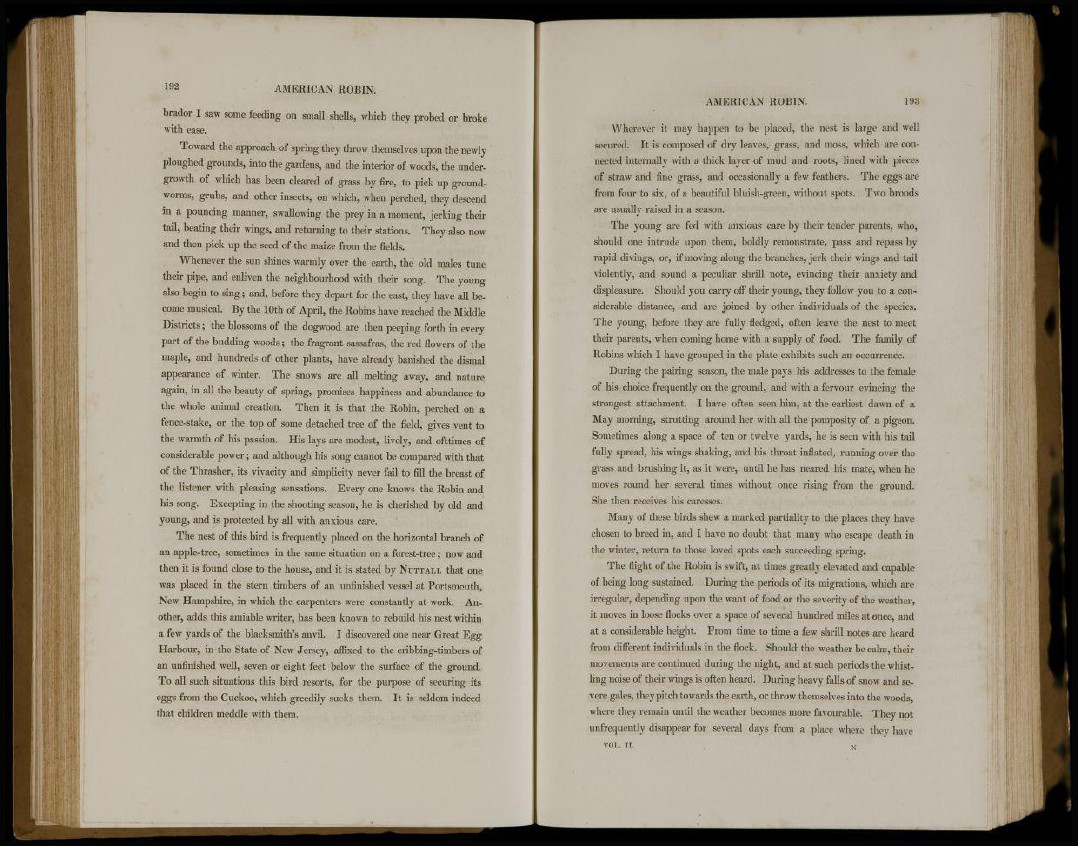
brador I saw some feeding on small shells, which they probed or broke
with ease.
Toward the approach of spring they throw themselves upon the newly
ploughed grounds, into the gardens, and the interior of woods, the undergrowth
of which has been cleared of grass by fire, to pick up groundworms,
grubs, and other insects, on which, when perched, they descend
in a pouncing manner, swallowing the prey in a moment, jerking their
tail, beating their wings, and returning to their stations. They also now
and then pick up the seed of the maize from the fields.
Whenever the sun shines warmly over the earth, the old males tune
their pipe, and enliven the neighbourhood with their song. The young
also begin to sing; and, before they depart for the east, they have all become
musical. By the 10th of April, the Robins have reached the Middle
Districts; the blossoms of the dogwood are then peeping forth in every
part of the budding woods; the fragrant sassafras, the red flowers of the
maple, and hundreds of other plants, have already banished the dismal
appearance of winter. The snows are all melting away, and nature
again, in all the beauty of spring, promises happiness and abundance to
the whole animal creation. Then it is that the Robin, perched on a
fence-stake, or the top of some detached tree of the field, gives vent to
the warmth of his passion. His lays are modest, lively, and ofttimes of
considerable power; and although his song cannot be compared with that
of the Thrasher, its vivacity and simplicity never fail to fill the breast of
the listener with pleasing sensations. Every one knows the Robin and
his song. Excepting in the shooting season, he is cherished by old and
young, and is protected by all with anxious care.
The nest of this bird is frequently placed on the horizontal branch of
an apple-tree, sometimes in the same situation on a forest-tree; now and
then it is found close to the house, and it is stated by NUTTALL that one
was placed in the stern timbers of an unfinished vessel at Portsmouth,
New Hampshire, in which the carpenters were constantly at work. Another,
adds this amiable writer, has been known to rebuild his nest within
a few yards of the blacksmith's anvil. I discovered one near Great Egg
Harbour, in the State of New Jersey, affixed to the cribbing-timbers of
an unfinished well, seven or eight feet below the surface of the ground.
To all such situations this bird resorts, for the purpose of securing its
eggs from the Cuckoo, which greedily sucks them. It is seldom indeed
that children meddle with them.
AMERICAN ROBIN. 193
Wherever it may happen to be placed, the nest is large and well
secured. It is composed of dry leaves, grass, and moss, which are connected
internally with a thick layer of mud and roots, lined with pieces
of straw and fine grass, and occasionally a few feathers. The eggs are
from four to six, of a beautiful bluish-green, without spots. Two broods
are usually raised in a season.
The young are fed with anxious care by their tender parents, who,
should one intrude upon them, boldly remonstrate, pass and repass by
rapid divings, or, if moving along the branches, jerk their wings and tail
violently, and sound a peculiar shrill note, evincing their anxiety and
displeasure. Should you carry off their young, they follow you to a considerable
distance, and are joined by other individuals of the species.
The young, before they are fully fledged, often leave the nest to meet
their parents, when coming home with a supply of food. The family of
Robins which I have grouped in the plate exhibits such an occurrence.
During the pairing season, the male pays his addresses to the female
of his choice frequently on the ground, and with a fervour evincing the
strongest attachment. I have often seen him, at the earliest dawn of a
May morning, strutting around her with all the pomposity of a pigeon.
Sometimes along a space of ten or twelve yards, he is seen with his tail
fully spread, his wings shaking, and his throat inflated, running over the
grass and brushing it, as it were, until he has neared his mate, when he
moves round her several times without once rising from the ground.
She then receives his caresses.
Many of these birds shew a marked partiality to the places they have
chosen to breed in, and I have no doubt that many who escape death in
the winter, return to those loved spots each succeeding spring.
The flight of the Robin is swift, at times greatly elevated and capable
of being long sustained. During the periods of its migrations, which are
irregular, depending upon the want of food or the severity of the weather,
it moves in loose flocks over a space of several hundred miles at once, and
at a considerable height. From time to time a few shrill notes are heard
from different individuals in the flock. Should the weather be calm, their
movements are continued during the night, and at such periods the whistling
noise of their wings is often heard. During heavy falls of snow and severe
gales, they pitch towards the earth, or throw themselves into the woods,
where they remain until the weather becomes more favourable. They not
unfrequently disappear for several days from a place where they have
VOL. ir. N